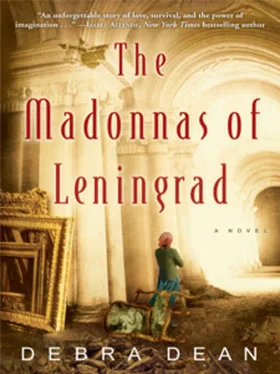“Remember how she used to make us wipe down our soup bowls with bread?” Helen asks.
Andrei grins. “You should have seen her, Naureen. She’d go nuts if we left anything on our plates. I mean anything. We had to stay at the table until they were clean. When I was a kid, I fell asleep face-first in a plate of Brussels sprouts. Oh, and remember the rhubarb?”
Helen rolls her eyes. “Stewed rhubarb. Canned rhubarb. Rhubarb juice. Chicken stuffed with rhubarb.”
“Your birthday?” Andrei prompts. The two of them sputter with laughter and Helen adds the punch line. “Rhubarb spice cake!”
“Papa put in some rhubarb one year,” she explains to Naureen. “The stuff went wild, it took over the whole garden. But she wasn’t going to let any of it go to waste. It was like a religion with her.”
“Eat until you see the pattern on the plate so tomorrow we will have nice weather,” Andrei recites, imitating his mother’s accent, and they convulse into laughter again.
Helen catches at her breath and releases a long, pent-up sigh.
“She just shoveled the food down us. I was such a fat kid, and then when I was in college and I started trying to diet, you’d have thought I was torturing her.
“I still can’t throw out food. Last week, I was making a recipe that called for egg whites, and I had these yolks. Two lousy egg yolks, and I couldn’t just dump them down the drain. It was like she was standing at my back, watching me. They’re still in the fridge. All these little containers of leftovers. A cup of rice pilaf. Half an orange in plastic wrap. A half-dozen grapes shriveled like peas.” She throws up her hands in mock surrender. “I’ve actually been thinking about getting another dog, just to have someone to feed the scraps to.”
Seventy-five grams of bread. Bread that is half sawdust, a small, dense block. It is the size of a ticket stub in her palm, the weight of dead leaves. Many evenings, this is their only food, and they must eat very slowly to stretch out this morsel of black bread into the length of a meal. She pulls off a tiny corner. It is nearly tasteless, but Marina eats it slowly, focusing on the sensations of chewing and swallowing. She calls up in her imagination the flavors of foods she has eaten, sausages and watermelon and pickled beets.
Her uncle is reading aloud from the text of his upcoming lecture, a droning recitation of dates and numbers.
Monday, bread rations were cut again, down to two hundred and fifty grams a day for workers, half that for dependents like Aunt Nadezhda. Not even an infant could survive on such a meager portion, and this must be divided into three meals. Some people gobble up their entire day’s ration as soon as they get it, but, as Uncle Viktor points out, they are fools. When the bread is gone, they are still hungry. There is never enough food to still one’s hunger. But time, time is measured in the space between one meal and the next, and without bread to look forward to, the day never ends.
People are starving. They have been reduced to eating unimaginable things. Bubi, Mikhail’s cat, was an early victim of their hunger. Not that they actually ate Bubi-they were still too squeamish for that-but they traded him away for a sack of potatoes and some cooking oil, knowing full well the fate to which they were consigning him. Now, they would eat him themselves without a second thought. They eat wallpaper paste and glue and even wood, and still they starve. The mind reels. It is unimaginable that in 1941, in Leningrad no less, people could actually be dying of starvation, and not just drunkards or ne’er-do-wells, but distinguished scholars and respected artists. Unimaginable, but true. They lie down and die as simply as going to sleep, and those left behind try to explain their deaths, try to find patterns to numb the horror. This person was elderly or that person was always thin as a matchstick. Those without purpose die sooner, and men are more susceptible than women, having less fat. Living alone is a liability, and having to share rations with dependents is a liability also.
Viktor has applied scientific rigor to the business of keeping them alive. In the mornings, he distributes the breakfast ration with the solemnity of a priest bestowing communion wafers. Later, when Nadezhda returns from the bakery with the bread, he carefully cuts it up into nine portions for that day’s lunch and dinner and the following day’s breakfast. Because Marina is doing physical labor and thus has higher caloric needs, her three nuggets of bread are cut slightly larger. They are wrapped in a cloth and set out of sight. On the days when the canteen serves up extra rations at lunch, a porridge made of boiled buckwheat groats or their famous aspic, the evening ration is halved again and the remainder set aside. If there is extra bread, he barters it on strict principles of nutrition and economy rather than succumbing, as Nadezhda might, to the temptations of the palate.
His scientific system of household management doesn’t factor in luck, though, and Marina has come to suspect that their survival may depend on something beyond the bounds of reason-call it luck or miracles or whatever you wish. Since that day back in October when she saw Anya praying to the Benois Madonna, she has begun to petition the Madonnas as well. When they are making their morning rounds and pass a frame that held a Madonna, she furtively mumbles a quick prayer and then improvises something like the crossing gestures Anya made over her chest. She doesn’t know the incantations one is supposed to recite. The first time, she just whispered, Help. Help us, please. That night, the god came to her on the roof.
Now she asks for things. She asks for Dmitri to come home. She asks for the god on the roof to return. She asks for food. It is foolish, a kind of wishing game that Mikhail and Tatiana might play.
Dmitri has not come home; neither has she heard any word of him. His division was decimated at Chudovo, and those who survived joined other divisions. He might be anywhere. Every morning, she scans the casualty list posted in the warden’s room, looking for his name. When it isn’t there, she feels a flush of gratitude. He may yet be alive, and who knows, perhaps Viktor will hear something of him when he goes to the front.
As for the god on the roof, she knows she imagined that. She has heard others complain of hallucinations brought on by hunger. Though this visitation felt more real than any moment before or since, a tangible consummation of the flesh, she must concede that there is no evidence to support such a wild rent in the fabric of the universe. She does not care. She has gone up to the roof night after night, hoping to hallucinate again, to be swept up into passion. But the statues on the roof have remained inanimate copper, refusing to alchemize into gold.
Still, there have been the miracles of food.
A week after Marina first approached the Madonnas, Nadezhda’s china, which had been languishing in a consignment shop since July, miraculously sold. Viktor returned from the black market with rice and rusks, and the smoky rock candy made from molten sugar excavated from the charred basement of the Badayev warehouse. They were able to save their ration coupons for the rest of the month. Then two weeks ago, when there was nothing left, when Marina had begun fainting at the slightest exertion, a group of sailors on the Palace Embankment presented her with an armful of pine branches. She ate an entire branch on the way back to the shelter, gnawing on the bark. It tasted wonderful, sharp and spicy, like eating the forest. They heard that in the hospital the needles are boiled to extract vitamins for those with scurvy, so Nadezhda made a fragrant broth with the rest.
Now, though he would not call it luck, Viktor has secured a place with the Goodwill Delegation from the Hermitage that will visit the front tomorrow. For the entertainment of the troops, he is scheduled to deliver a lecture on the ancient civilization of Urartu. There will be a banquet following the proceedings, and an honorarium will be paid in butter and vodka.
Читать дальше












